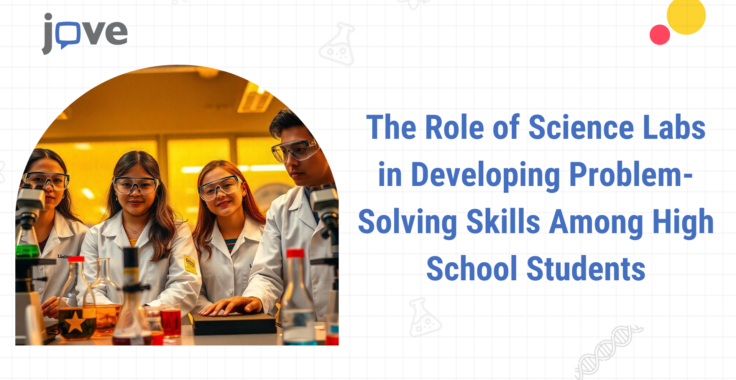
The Role of Science Labs in Developing Problem-Solving Skills Among High School Students
Science labs are critical to shaping the learning experience of high school students. They offer more than just hands-on learning—they are environments where students can apply theoretical knowledge and engage in science experiments. Through these experiences, students build critical thinking in science and problem-solving abilities, which are essential skills in STEM education and beyond.
According to a report by the National Center for Education Statistics (NCES), students who actively participate in lab-based science classes perform better academically and show higher engagement compared to students in lecture-only settings
JoVE provides valuable resources for science labs, such as educational videos and simulations, to help students explore and understand complex scientific concepts. By integrating hands-on learning in labs, students become more adept at developing hypotheses, testing ideas, and drawing conclusions.
How Science Labs Build Critical Thinking Skills
Science labs are more than just a space to conduct experiments. They provide an interactive platform where students can move beyond passive learning and actively engage with scientific concepts. In the classroom, students often learn through lectures or reading, but in the lab, they apply that knowledge through real-world experimentation. This process develops critical thinking in science, as students must observe, analyze, and make connections between their results and theoretical concepts.
For example, in a physics lab, students may use science experiments to measure the effects of gravity on different objects. The act of conducting these experiments fosters an analytical mindset, teaching students to ask questions, troubleshoot issues, and adapt when results don’t meet expectations.
The Impact of Hands-On Learning in Labs
Hands-on learning in labs is invaluable for high school students. By physically conducting experiments, students gain a deeper understanding of scientific principles and methodologies. Labs encourage students to make observations, collect data, and form conclusions based on evidence. This method of learning develops problem-solving strategies in STEM that go beyond theoretical knowledge.
Research from the Education Resources Information Center (ERIC) further supports this, showing that students engaged in hands-on science labs develop stronger problem-solving skills and critical thinking, which are essential for success in STEM fields.
In a chemistry lab, for example, students might explore reaction rates by changing variables such as temperature or concentration. Through trial and error, they learn how these factors affect the results, helping them develop critical problem-solving skills. JoVE’s resources enhance these experiments by providing step-by-step video demonstrations, making the learning experience more immersive and effective.
Case Study: Enhancing Lab Performance with Educational Videos
A study at DeSales University demonstrated the power of integrating JoVE’s educational videos into science labs. Biology students who used JoVE videos before conducting lab experiments on plasmid purification and gel electrophoresis performed up to 100% better on assessments compared to those who relied solely on traditional lab handouts. This case study highlights the effectiveness of visual learning aids in reinforcing scientific concepts and improving student performance in labs.
Access the Source of the above study here
Problem-Solving Strategies in STEM Through Science Labs
In STEM education, problem-solving is a fundamental skill. Science labs teach students how to navigate challenges by applying the scientific method—forming hypotheses, conducting experiments, observing outcomes, and drawing conclusions. Through science experiments, students learn how to adapt their approach when they encounter unexpected results.
For example, a biology experiment may involve studying cell division under a microscope. If the results don’t align with their predictions, students must rethink their hypotheses and adjust their experiments accordingly. This iterative process not only strengthens their problem-solving strategies in STEM but also builds resilience and adaptability.
JoVE’s Role in Enhancing Science Lab Learning
JoVE plays an essential role in supporting science lab learning by providing students with visual aids that complement hands-on experiments. JoVE’s video library includes comprehensive demonstrations of science experiments that guide students through complex processes. Whether it’s understanding chemical reactions or exploring the laws of motion, JoVE ensures that students are equipped with the knowledge they need to succeed in the lab.
JoVE also offers quizzes and simulations, allowing students to test their understanding and apply their knowledge in practical settings. By integrating JoVE into their curriculum, teachers can provide students with a more enriched and engaging science lab experience.
Conclusion: Building Future Problem-Solvers in Science Labs
Science labs are fundamental to fostering critical thinking and problem-solving skills in high school students. By engaging in hands-on learning in labs, students are better equipped to tackle real-world challenges in STEM fields. JoVE provides the resources needed to enhance these experiences, offering videos and simulations that make science experiments more accessible and effective.
Why wait? Sign up for JoVE today to access thousands of science videos, lab simulations, and more. Enhance your teaching and give your students the dynamic learning experiences they need to thrive in today’s world.
Start now for free and access 20 JoVE science videos to see how they can transform your classroom!